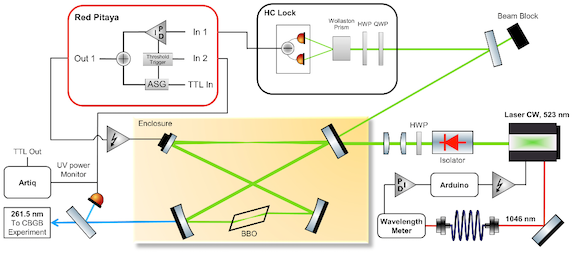Abstract
We present what we believe to be a novel technique to minimize UV-induced damage in experiments that employ second-harmonic generation cavities. The principle of our approach is to reduce the duty cycle of the UV light as much as possible to prolong the lifetime of the used optics. The low duty cycle is achieved by ramping the cavity into resonance for a short time during the experimental cycle when the light is used and tuning it to an off-resonant state otherwise. The necessary fast ramp and length-stabilization control of the cavity is implemented with the FPGA-based STEMlab platform. We demonstrate the utility of this method by measuring the isotope shift of the electronic transition (X1Σ ← A1Π) in AlCl at 261.5 nm in a pulsed molecular beam experiment.
